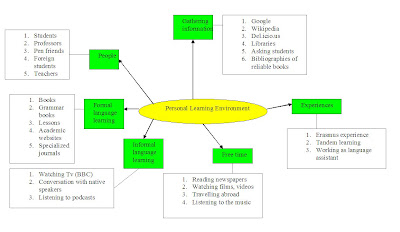
Tuesday, December 25, 2007
Wednesday, December 5, 2007
The mindmap of my Personal Learning Environment
Below you can see the mindmap of my Personal Learning Environment. I divided it into 6 different areas: gathering information, people, informal and formal language learning, free time and experiences.

Gathering information
I usually search for information on Google, Del.icio.us and sometimes on Wikipedia when I need to find precise contents, whereas I prefer going to a library when I need more theoretical sources. Having many friends who study at University it’s a good resource! I mean, sometimes it happens that you have doubts and a piece of advice given by someone you trust can be very helpful. Furthermore, a good practice is to check bibliographies because they can help you to find information which better meet your needs.
People
Professors and teachers are the most reliable sources of information, the people who can teach you many things and obviously the most important ‘points of reference’ for your learning process. However, students and pen friends can help you develop oral skills and improve your vocabulary because you can communicate with them in a lot of contexts.
Formal language learning
Formal language learning is essential but you need to integrate it with informal learning. Books, grammar books, specialized journals, lessons and academic websites are fundamental because they offer you good materials, but since they belong to ‘imposed sources’ it is necessary that you take advantage of something that interests you.
Informal language learning
Watching TV, listening to podcasts and talking with native speakers give you the opportunity of using foreign languages when you have finished your studies as well. We all know how important it is to continue to speak and hear a foreign language, otherwise you tend to forget it!
Free time
Your free time can become productive if you listen to foreign songs or if you watch films trying to understand words. Travelling abroad is a wonderful experience, but at the same time you can learn a lot about the culture of a foreign country.
Experiences
Erasmus projects and tandem learning are the best occasions to get in contact with a different country. However, if you have already finished your studies I think that a job like ‘language assistant’ can give you many opportunities to practice foreign languages in many different contexts, such as answering the telephone, writing letters, speaking with foreign people and often travelling as well.
To build your mindmap of your PLE is a useful activity because it allows you to reflect on what you do and will do to learn and improve your language skills. If you compare your PLE with those of your peers you can see the differencies and obtain other suggestions which you might find interesting and useful during your career.
Bye,
Elisa